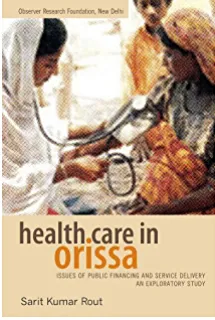The Indian health system is facing multiple challenges in terms of increasing access and providing quality care to large sections of people. In course of time, the complexities have gone up with rising HIV aids, life style diseases like cardio vascular diseases, diabetics, and a number of environmental and pollution related infections affecting millions of people staying in urban locations.
Building effective health system in a federal structure like us entails larger responsibility with the state governments while the central government’s role has been largely providing policy directions for improving health status of people. Orissa, a backward state, situated in the eastern region of the country has been undertaking a number of policy measures to strengthen its public health care system. However public spending has stagnated around 1 percent of GSDP for a long time and public health system has been facing with a number of constrains like inadequate infrastructure, man power etc. A large chunk of health budget is utilized for salary and other regular expenditure leaving scant resources for infrastructure, drugs and other inputs. The health indicators across income and caste groups particularly among Scheduled Tribes and Scheduled Castes are deplorable. The mother and child health indicator for example IMR though has improved in recent years is worse. In remote rural areas the primary health care functions badly. In the absence of referral system at the block level, the district headquarter hospitals are overloaded with patients. Service delivery is affected largely in tribal regions due to inadequate doctors, specialists and para medicos. This is further complicated by administrative and management bottlenecks. The efforts for strengthening public health care system through introduction of health sector reforms and other initiatives have not brought desired changes. This has not helped in improving health system governance and service delivery. This book makes a modest attempt to unravel the operational and functional issues in public health care system of the state with emphasis on district sector spending and governance issues. Examining the nature and trend of public spending on health care at the state as well as district level this book presents the ground reality in terms of service delivery against the policy pronouncements.
This is a useful book for the policy makers, public health specialists, civil society organizations, researchers and students pursuing Master in Public Health in different institutions in the country.
The views expressed above belong to the author(s). ORF research and analyses now available on Telegram! Click here to access our curated content — blogs, longforms and interviews.





 PREV
PREV


